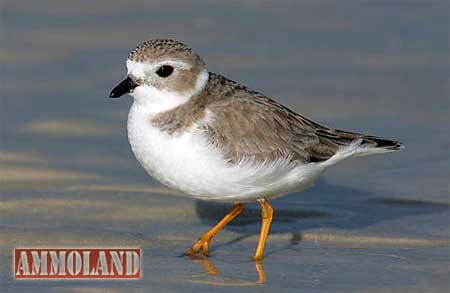Training for beachnesting bird monitors to be held May 17 at Cape Henlopen State Park, Delaware


Delaware -(Ammoland.com)- Beachnesting bird monitors on April 25 spotted the first piping plover nest of the season on the Point at Cape Henlopen State Park in Lewes – one of the earliest piping plover nests on record in Delaware, with egg-laying typically starting in early May.
“The nest is well inside the area that was closed to beachgoers last month for beachnesting season, so both the nest and the incubating adult plovers will be protected from undue disturbance,” said Wildlife Biologist Matthew Bailey, noting that two other plover pairs have set up territories on the Point and another pair has been spotted at Gordons Pond. Also, a pair of American oystercatchers has been sighted on the Point, but has yet to lay eggs, he added.
Training for volunteer beachnesting bird monitors to be held May 17
Volunteers who want to learn more about Delaware’s endangered piping plovers and other beachnesting birds and find out how they can join DNREC’s monitoring team are invited to a training session from 11 a.m. to 1 p.m. Sunday, May 17, at the Biden Center at Cape Henlopen State Park in Lewes, Delaware.
“With nesting starting early this year and the busy beach season beginning soon, we’re looking to mobilize our crew of Plover Patrol volunteers at Cape Henlopen, and along with numerous volunteers who have continued to help us over the years, also hoping to see new faces joining our ranks,” Bailey said.
The training session will begin with refreshments and a slideshow, followed by a discussion on the monitoring program and how volunteers can help to ensure that beachnesting shorebirds are not disturbed while rearing their chicks.
Weather permitting, the group will finish the session by venturing out to the Point at Cape Henlopen to look for piping plovers and other shorebirds likely to be feeding on the tidal flats. Birding scopes and binoculars will be available for use, but volunteers are encouraged to bring their own optics if they have them.
“Volunteers are critical to our protection efforts. When posted at the boundaries of the nesting areas, they can help explain facts about breeding birds and the importance of keeping closed areas free of human disturbance,” Bailey said. Without having volunteers to supplement the coverage our staff provides, many people might never have the chance to better understand how humans can make a difference in the breeding success of beachnesting birds.”
Preregistration is encouraged, but attendees also will be accepted at the door. Park entrance fees will be waived for volunteers attending the training by notifying the fee booth attendant. For more information on the training, beachnesting birds or monitoring efforts, please contact Matthew Bailey at 302-382-4151 or email matthew.bailey@state.de.us.
About the piping plover
The piping plover was listed as threatened under the federal Endangered Species Act (ESA) in 1986, and the Division of Fish and Wildlife is responsible for its protection in Delaware. Under a binding agreement and subsequent species management plan that DNREC made in 1990 with the U.S. Fish and Wildlife Service (USFWS), the federal agency with oversight of this ESA-protected species, piping plover nesting areas at Cape Henlopen State Park are closed annually to the public to protect the shorebirds from disturbance during their nesting season which usually runs from March into September. This includes the Point and smaller areas around Gordon’s Pond. The closure has been successful, increasing the number of piping plover nesting pairs from a low of two pairs to a high of nine pairs, and must include feeding habitat as well as nesting areas. Piping plovers feed on small invertebrates that inhabit the intertidal zone near their nesting territories. Chicks are not fed by their parents, but rather are led to the shoreline to forage while the adults keep watch for potential threats. Allowing pedestrian traffic in the intertidal zone adjoining nesting areas would disturb the vital link between nesting and foraging habitat and risk adverse stress or mortality to the chicks.
